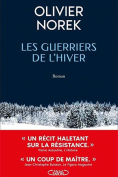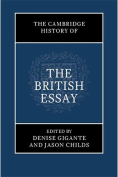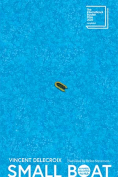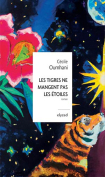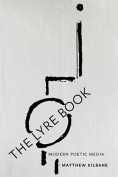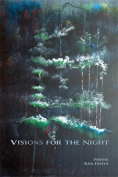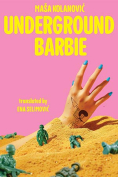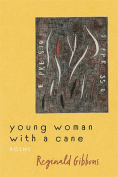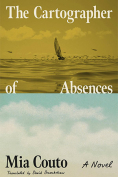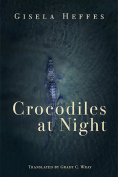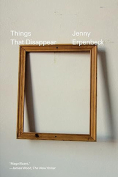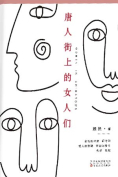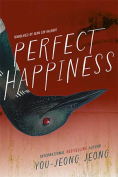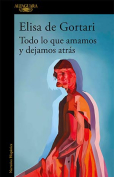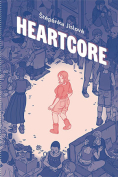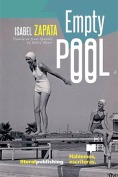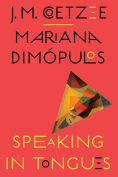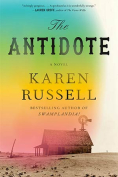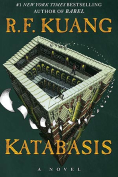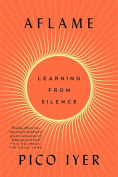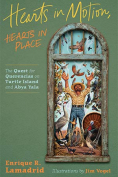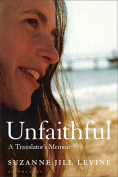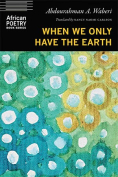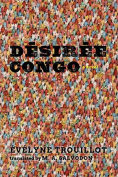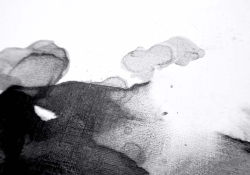When We Only Have the Earth by Abdourahman A. Waberi
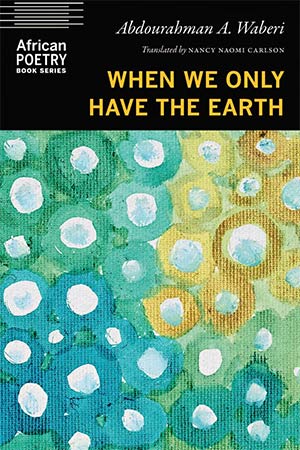
Lincoln. University of Nebraska Press. 2025. 80 pages.
When We Only Have the Earth, by Djibouti poet, novelist, and essayist Abdourahman A. Waberi, begins with “One Saturday in Virginia,” where a much-anticipated meeting between the speaker and a Bouvier des Flandres dog takes on epic proportions. The flux between the comically mundane (“Imposing and impatient, he wags his tail at my immobilized self”) and the divine through the animal’s unfettered joy also teaches us how to read Waberi’s work in the context of his wanderlust from Virginia to Milan. Much as in John Berryman’s The Dream Songs, where an inversion occurs between god and dog, there is a sui generis constellation/melding of figures from Greco-Roman myth (“Happier than Ulysses, more pagan than Virgil”) to traditions outside the Western canon (“Mother Earth drinks the drops / Pachamama increases them tenfold / Seeding tempests and torrents midair / Forming currents, forming ponds and lagoons”). It ends with self-introspection: “Today’s the day I meet / The Bouvier des Flandres / I fear my reflection in the menhir’s mirror.”
The collection features three sections, with an interlude after the first. A sense of bravado and keen sense of being out of place and in transition carries the first section, “Dare to Turn into the Earth,” which features poems like “Wonder Train,” “Sahel! Sa(y) Hel(lo),” and “In Pennsylvania.” Visually, these poems alternate between left-aligned and right-aligned lines that establish Waberi as a “Lonely prophet” who “stay[s] here / Head down writing page after page.” However, Waberi never really sits still in time but ponders its movement with lines like: “Let me cut out this minute / In the fabric of time / Hunched over, with a trembling hand, like others” or “The oxen know nothing of cleansing of the mind / They bellow, they graze, / They watch the train of the present / Come back in an instant.” This shrinking and expansion of time in the deep observation of the animal through the writer is the “dare” that Waberi gladly takes on. As Nancy Naomi Carlson observes in her translator’s note, the original title of “Sahel! Sa(y) Hel(lo)” features the name of the region in Africa and the French expression for loudly calling to something or someone. Thus, “Sahel! Ça hèle” becomes, after much tinkering and labor, “Sahel! Sa(y) Hel(lo),” which carries the intonation and diction of the original without becoming too forced.
In the second section, “Here I Am,” Waberi speaks to his silence or inner silence. In “It Won’t Be Long,” he writes that “It’s a Danaidan task to try / Only try to break out of our inner prisons // An illusion to think we rise with the sun / Go to bed with the moon.” These contrasting motifs of delusion versus reality and interiority versus exteriority recur throughout the remaining poems in the section. To illustrate, in “My Silence Told Me,” a poem that functions as an ars poetica, Waberi alludes to no muse other than his own silence and inner silence. In this soliloquy, he writes of desiring to throw his experience “into the two-way mirror / Of [his] deep illusions” while also ensuring that “Your chant must be restrained / Cultivate the humus in the plot of modesty.”
This desire for restraint is mirrored in this collection’s poetic form, which even while modulating in line length ranging from short (“I am here / Right here”) to longer (“It enjoys a crowd of chubby-cheeked angels leading a charge of maybes”), enjoys a directness in address, which fits with Waberi’s purpose “to disrupt the patriarchy’s whim” with the directness of lines.
Waberi’s poems, in addition to gesturing toward complex dualities, also counsel against and question capitalism’s dictates of extraction and greed with Fanon’s whispered refrain: “O my body, / Always make me / A questioning man!” Through them, Waberi contemplates the meaning of value. “The oyster secrete a small pearl / From a wound,” Waberi writes, and “men went blind / Diving into the sea / To bring this pearl to the surface.”
The third section, Afrokhoï sapiens, is in the words of Waberi a “poem in a picture engraved in the rock [which] burst into my brain after my visit to the Origins Centre (Museum of Humankind), Johannesburg in April 2014.” In pictoems ranging from “Genesis” to “Trace,” the poems land in a burst of praise for the eland, no longer referred to as its binomen (“The imposing Taurotragus oryx”), who offers wisdom fora new era: “The Supreme Eland’s manes are with us.”
The call to action that ends the collection—“Dare to love [the earth] beyond all rational thought”—is radical and radial, as Waberi shows us how to “turn into earth both literally and figuratively.” (Editorial note: Waberi’s bilingual “A Touch of Salt on My Confession,” translated by Carlson, appeared in the Nov. 2023 issue of WLT.)
Tiffany Troy
Flushing, New York

